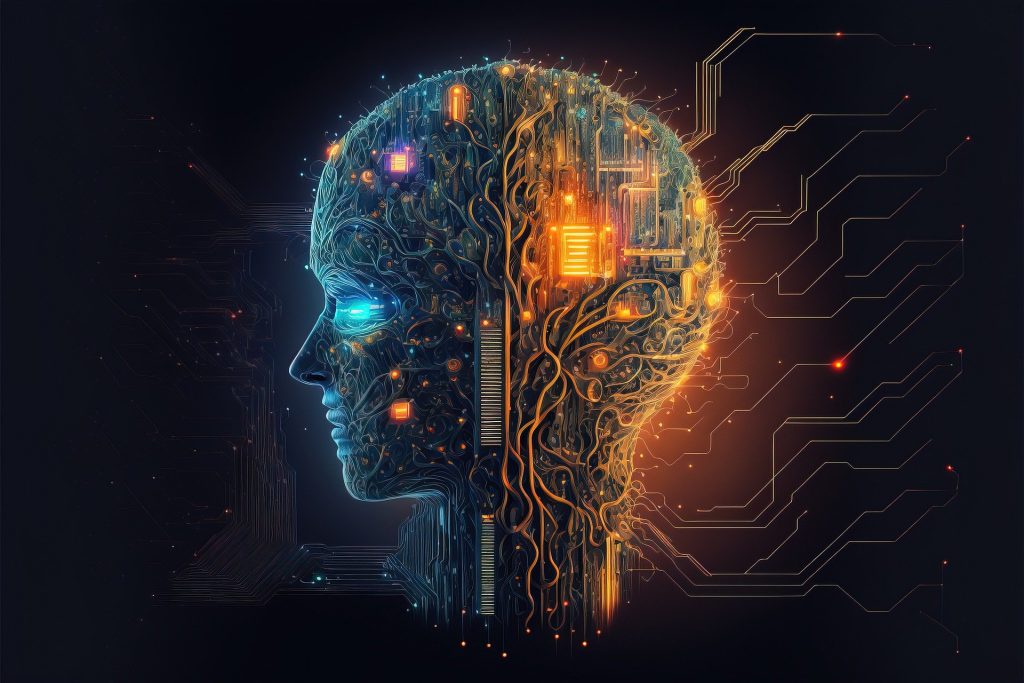AI chat, or artificial intelligence chat, is a technology that employs machine learning and natural language processing to emulate human conversation through a chat interface. This innovation enables businesses to automate customer interactions, provide immediate responses to queries, and deliver personalized support without human intervention. AI chat systems can be integrated into various platforms, including websites, mobile applications, and messaging services, allowing companies to engage with customers in real-time and offer round-the-clock support.
These AI chat systems are engineered to comprehend and interpret natural language, enabling them to understand and respond to customer inquiries conversationally. The systems can be trained to identify patterns in customer interactions, learn from previous conversations, and continuously refine their responses over time. By utilizing AI chat technology, businesses can optimize their customer service operations, decrease response times, and improve the overall customer experience.
Key Takeaways
- AI chat refers to the use of artificial intelligence to facilitate conversations with customers through chat interfaces.
- AI chat can improve customer engagement by providing instant responses, 24/7 availability, and personalized interactions.
- Implementing AI chat in customer service requires careful planning, training, and integration with existing systems.
- Personalizing customer interactions with AI chat involves using customer data to tailor responses and recommendations.
- Analyzing customer data with AI chat can provide valuable insights for improving products, services, and customer experiences.
- Overcoming challenges in AI chat implementation includes addressing privacy concerns, ensuring accuracy, and managing customer expectations.
- The future of AI chat in customer engagement is expected to involve more advanced natural language processing, predictive analytics, and seamless integration with other channels.
Benefits of AI Chat for Customer Engagement
24/7 Availability and Instant Responses
One of the key advantages of AI chat is its ability to provide instant responses to customer inquiries, regardless of the time of day. This 24/7 availability ensures that customers can receive support and information whenever they need it, leading to higher satisfaction and loyalty.
Scalability and Efficiency
AI chat also enables businesses to handle a larger volume of customer inquiries simultaneously, without the need for additional human resources. This scalability allows businesses to improve their efficiency and reduce operational costs while maintaining high levels of customer service. Additionally, AI chat systems can be programmed to provide consistent and accurate information, reducing the risk of human error and ensuring that customers receive reliable support.
Data-Driven Insights and Personalization
Furthermore, AI chat can help businesses gather valuable insights about their customers’ needs, preferences, and behavior. By analyzing the data collected from customer interactions, businesses can gain a deeper understanding of their target audience and tailor their products and services to better meet their customers’ needs. This data-driven approach can lead to more effective marketing strategies, product development, and customer retention efforts.
Implementing AI Chat in Customer Service

Implementing AI chat in customer service requires careful planning and consideration to ensure a seamless integration and optimal performance. The first step in implementing AI chat is to select a suitable platform or provider that meets the specific needs and requirements of the business. Businesses should consider factors such as the scalability, customization options, and integration capabilities of the AI chat platform to ensure that it aligns with their customer service goals.
Once a platform has been selected, businesses should focus on training the AI chat system to understand and respond to customer inquiries effectively. This involves creating a knowledge base of frequently asked questions, developing conversational scripts, and fine-tuning the system’s natural language processing capabilities. Additionally, businesses should establish clear guidelines for when human intervention is necessary and ensure that the AI chat system can seamlessly transfer inquiries to human agents when needed.
Furthermore, businesses should continuously monitor and evaluate the performance of the AI chat system to identify areas for improvement and optimization. This may involve analyzing customer feedback, tracking key performance metrics, and refining the system’s responses based on real-time data. By continuously iterating on the AI chat system, businesses can ensure that it remains effective and aligned with their customer service objectives.
Personalizing Customer Interactions with AI Chat
| Metrics | Value |
|---|---|
| Customer Satisfaction | 85% |
| Response Time | 30 seconds |
| Conversion Rate | 12% |
| Retention Rate | 90% |
One of the key advantages of AI chat is its ability to personalize customer interactions based on individual preferences, behavior, and past interactions. By leveraging data analytics and machine learning algorithms, AI chat systems can deliver tailored recommendations, product suggestions, and support solutions to each customer. This personalized approach can enhance the overall customer experience and foster stronger relationships between businesses and their customers.
AI chat systems can analyze customer data such as purchase history, browsing behavior, and demographic information to gain insights into each customer’s preferences and needs. By leveraging this data, businesses can deliver targeted messages, promotions, and support solutions that are relevant to each customer’s unique interests. This personalized approach can lead to higher engagement, increased sales, and improved customer satisfaction.
Furthermore, AI chat systems can use natural language processing capabilities to understand and respond to customers in a conversational manner. This human-like interaction can create a more engaging and personalized experience for customers, leading to stronger emotional connections with the brand. By simulating human conversation, AI chat systems can build trust and rapport with customers, ultimately leading to higher levels of loyalty and advocacy.
Analyzing Customer Data with AI Chat
AI chat systems play a crucial role in analyzing customer data to gain valuable insights into customer behavior, preferences, and needs. By leveraging machine learning algorithms and data analytics tools, AI chat systems can process large volumes of customer data in real-time to identify patterns, trends, and opportunities for personalization. This data-driven approach enables businesses to make informed decisions about their products, services, and marketing strategies.
AI chat systems can track and analyze various types of customer data, including conversation transcripts, purchase history, website interactions, and social media engagement. By aggregating and analyzing this data, businesses can gain a comprehensive understanding of their customers’ preferences, pain points, and purchasing behavior. This insight can inform product development efforts, marketing campaigns, and customer support strategies to better meet the needs of the target audience.
Furthermore, AI chat systems can use predictive analytics to anticipate customer needs and behavior based on historical data. By identifying patterns in customer interactions and purchase history, AI chat systems can deliver proactive support and personalized recommendations to customers. This predictive approach can help businesses anticipate demand, optimize inventory management, and deliver targeted promotions to drive sales.
Overcoming Challenges in AI Chat Implementation

While implementing AI chat in customer service offers numerous benefits, businesses may encounter challenges that need to be addressed to ensure successful deployment and operation. One common challenge is ensuring that the AI chat system can effectively understand and respond to a wide range of customer inquiries in a conversational manner. This requires extensive training and fine-tuning of the natural language processing capabilities of the system to ensure that it can accurately interpret customer queries.
Another challenge is maintaining consistency and accuracy in the responses provided by the AI chat system. Businesses need to continuously monitor the performance of the system and update its knowledge base to ensure that it remains up-to-date with the latest information and best practices. Additionally, businesses should establish clear guidelines for when human intervention is necessary to handle complex or sensitive inquiries that require a human touch.
Furthermore, businesses need to address concerns related to data privacy and security when implementing AI chat systems. It is essential to ensure that customer data is handled in compliance with relevant regulations and industry standards to protect customer privacy and build trust. Implementing robust security measures and encryption protocols can help mitigate the risk of data breaches or unauthorized access to sensitive information.
Future of AI Chat in Customer Engagement
The future of AI chat in customer engagement is poised for significant growth and innovation as businesses continue to leverage this technology to enhance their customer service capabilities. One key trend is the integration of AI chat with other emerging technologies such as augmented reality (AR) and virtual reality (VR) to create immersive and interactive customer experiences. By combining AI chat with AR/VR technologies, businesses can offer virtual product demonstrations, interactive support solutions, and personalized shopping experiences.
Another future trend is the advancement of voice-enabled AI chat systems that allow customers to interact with businesses using voice commands. Voice recognition technology is rapidly evolving, enabling AI chat systems to understand natural language spoken by customers and provide instant responses through voice interfaces. This trend has the potential to revolutionize customer engagement by offering hands-free interactions that are convenient and intuitive for customers.
Furthermore, the future of AI chat in customer engagement will likely involve greater personalization through advanced machine learning algorithms that can analyze complex data sets in real-time. By leveraging predictive analytics and deep learning techniques, AI chat systems can deliver highly personalized recommendations, support solutions, and marketing messages that are tailored to each individual customer’s unique preferences and needs. In conclusion, AI chat technology offers significant potential for businesses to enhance their customer engagement strategies by providing instant responses, personalized interactions, and valuable insights into customer behavior.
By carefully implementing AI chat systems and addressing challenges related to natural language processing, consistency, accuracy, data privacy, and security, businesses can leverage this technology to drive higher levels of customer satisfaction, loyalty, and advocacy. Looking ahead, the future of AI chat in customer engagement is likely to involve further innovation in immersive experiences, voice-enabled interactions, and advanced personalization capabilities driven by machine learning algorithms. As businesses continue to embrace AI chat technology as a key component of their customer service operations, they will be well-positioned to deliver exceptional experiences that meet the evolving needs of their customers in an increasingly digital world.



